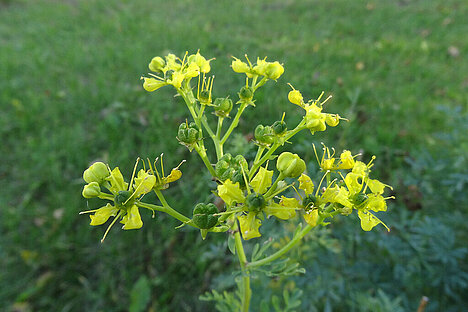Rue herb

What is rue herb?
Rue is a plant from the rue family and originally comes from the Mediterranean region. The plant has gray-green leaves and small yellow flowers. It is often used as a medicinal plant and contains various essential oils that give it a strong odor.
Benefits of rue herb for dogs
Rue herb can also be useful for dogs due to its many positive properties. Here are some benefits of rue herb for dogs:
- Digestive problems: rue herb can help with digestive problems such as bloating, stomach pain or diarrhea. It can also be used for vomiting and nausea.
- Pain relief: Rue can help with arthritis, joint pain and other aches and pains as it has anti-inflammatory properties.
- Protection against parasites: Rue herb can repel parasites such as fleas, ticks and lice.
Disadvantages of rue herb for dogs
Although rue for dogs has many benefits, there are also some disadvantages that you should be aware of:
- Toxic: Rue herb is toxic to dogs in large quantities and can cause severe symptoms of poisoning. Symptoms range from vomiting and diarrhea to neurological problems.
- Sensitivity: Some dogs may be sensitive to rue. They may experience allergic reactions such as skin rashes or itching.
How can you give your dog rue?
If you want to give your dog rue, you should always do so under the supervision of a vet. The recommended dosage depends on your dog's weight and it is important not to give too much.
There are various ways to give rue to your dog, for example as a tea, extract or ointment. You can also buy ready-made preparations that contain rue.
Rue can be useful for dogs in certain cases, especially for digestive problems, pain relief and parasite protection. However, it is important to pay attention to the dosage and make sure that your dog is not allergic to rue.
If you notice any signs of hypersensitivity or poisoning in your dog, you should see your vet immediately. We are not a substitute for a vet, but we try to be as accurate as possible. Every dog reacts differently and we recommend you get a second opinion or consult your vet if in doubt.
Stay healthy and take good care of your four-legged friend!😊